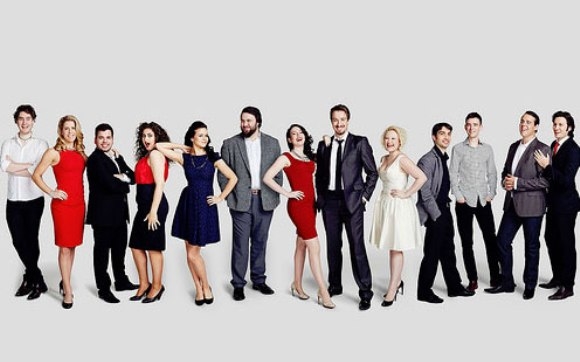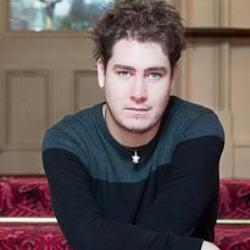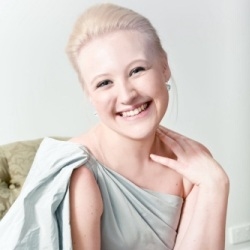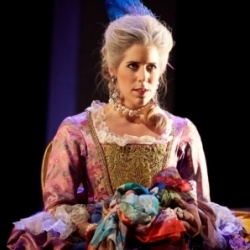The Royal Opera's worldbeaters

As with British Youth Opera, an organisation whose name would seem – erroneously – to promise endless reruns of Noye’s Fludde, the members of the Jette Parker Young Artists programme are professionals who have already made good on the circuit. Like similar schemes worldwide, it’s a shortcut to higher things.
Every year the Royal Opera recruits the cream of new talent from around the world and offers them a platform whereon to experience the delights and disciplines of life at the top table. It’s no easy ride, as the current young director, Australian Greg Eldridge, can confirm.

"We get assigned to jobs on the main stage – I’m attached to productions as an assistant which often requires more work than directing because you’ve got to work on someone else’s vision. I'm working on six main stage productions this year, each for about five weeks. Often they overlap: for example I’m currently preparing Tristan und Isolde while I’m still directing La scala di seta."
That early Rossini opera, in English The Silken Ladder, is this autumn’s JPYA production in the Linbury Theatre, and Eldridge is directing it. Originally a 'straight' theatre specialist, he made the switch to opera several years ago and has clear ideas on the distinctions between the two art forms.
"There’s a huge skill in being able to work within a structure to create something. Music is so emotive and it gives us more opportunity to explore the cerebral side of character. If we have 16 instrumental bars, there are so many ways of filling them! It’s often the silences that tell us the most and theatre actors are sometimes reluctant to go with that. Take Christof Loy’s Tristan that I’m working on: there’s no massive set – it’s all about character relationship, and it’s the unspoken (or sung) moments that tell you the relationships going on.
"This is the only place in the world that has such an opportunity for directors, and that’s a shame. It’s difficult for us to find training because there’s no set career path for a director. So hooray for the Royal Opera!"
The young Italian conductor Jonathan Santagada concurs. "I get to do everything – répétiteur, assistant conductor – and to work with some of the world’s greatest conductors. Normally we start two weeks before the maestro arrives, doing music preparation and one-to-one coaching with the singers in order to pave the way. You can’t get bored!"
'We’re not rivals; on the contrary, we’re a close-knit group'
There are ten singers on the programme at any one time, several of whom have gone on to great things. We might easily forget that the Royal Opera scheme nurtured the early careers of Sally Matthews, Marina Poplavskaya, Jacques Imbrailo and even Alfie Boe. The roll-call of alumni grows longer year by year. One of the last intake’s most notable talents, the remarkable young tenor David Butt Philip, opens next week as Rodolfo in English National Opera‘s La bohème.
The Australian Kiandra Howarth was already doing very nicely, thank you, as a principal soprano at Opera Australia, before she joined the programme. What was the appeal?

"There are so many things here that all happen at once so it’s a step up in terms of finding stamina as a singer. As well as singing small parts I get to cover major roles – for instance I covered for Anna Prohaska in Dialogues des Carmélites and went on for her at the general rehearsal when she was unwell.
"Getting in was a bit of a competition. There were about 400 singers who applied and 70 of us got through the first round, 30 to the second and 12 in the final round on the main stage. But we’re not rivals now we’re here; on the contrary, we’re a close-knit group. We all have different voice types so we’re not vying for the same roles."
Eldridge is irrepressible about his directing opportunities, and about re-rehearsing other people’s visions. "The Francesca Zambello Carmen is all set very fluidly so that singers can make the role their own. But you still have to be on your guard! Her death at the end has to be handled carefully because if José kills Carmen deliberately he is a murderer – and that is making a big statement about his crime – whereas if he kills Carmen in a fit of passion it’s something quite different.
"I have to walk in on the first day fully prepared so that if the director, say, is sick then people can be confident that we know what we’re doing. We need to have a complete command of each opera we're assigned to and that takes an enormous amount of work that’s sometimes overlooked. And of course most of what we do is never used."
Each young artist stays on the scheme for two years, during which time they live and breathe the Royal Opera’s way of life. Santagada, who only joined the scheme for a few weeks ago, hasn’t thought further into the future than that.
"I’ve never planned anything in my career, yet here I am! I don’t think it helps to look too far ahead. I’m very happy that at the moment I’m both a répétiteur and a conductor, and I don’t have to make a decision yet about what happens next."











